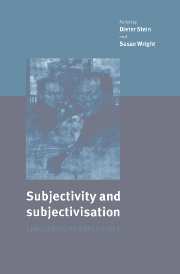Book contents
- Frontmatter
- Contents
- Contributors
- 1 Subjectivity and subjectivisation: an introduction
- 2 The epistemic weil
- 3 Subjectification in grammaticalisation
- 4 Emphatic and reflexive -self: expectations, viewpoint, and subjectivity
- 5 Subjectification and the development of the English perfect
- 6 Subjectification, syntax, and communication
- 7 Subjective meanings and the history of inversions in English
- 8 Subjectivity and experiential syntax
- 9 Non-anaphoric reflexives in free indirect style: expressing the subjectivity of the non-speaker
- 10 From empathetic deixis to empathetic narrative: stylisation and (de)subjectivisation as processes of language change
- Subject index
- Name index
2 - The epistemic weil
Published online by Cambridge University Press: 23 October 2009
- Frontmatter
- Contents
- Contributors
- 1 Subjectivity and subjectivisation: an introduction
- 2 The epistemic weil
- 3 Subjectification in grammaticalisation
- 4 Emphatic and reflexive -self: expectations, viewpoint, and subjectivity
- 5 Subjectification and the development of the English perfect
- 6 Subjectification, syntax, and communication
- 7 Subjective meanings and the history of inversions in English
- 8 Subjectivity and experiential syntax
- 9 Non-anaphoric reflexives in free indirect style: expressing the subjectivity of the non-speaker
- 10 From empathetic deixis to empathetic narrative: stylisation and (de)subjectivisation as processes of language change
- Subject index
- Name index
Summary
1 In present-day colloquial German, one is more likely to hear the utterances in (ii) than the formal, ‘correct’ one in (i):
(i) Er ist nach Hause gegangen, weil er Kopfweh hatte.
(ii) Er ist nach Hause gegangen, weil er hatte Kopfweh.
The word weil is changing from a hypotactic to a paratactic conjunction, with considerable syntactic consequences. The change of word order involved in this shift not only draws considerable attention to itself; it also tends to be misunderstood and often criticised. At first glance, the preference for utterance (ii) over (i) seems to be indicative of nothing more than the laziness characteristic of spoken language – main clause order instead of the more ‘complicated’ subordinate clause order – just another piece of evidence for the decay of morals and language observed everywhere. This is the typical opinion of speakers who look critically at their own and other people's use of language.
There are two things to notice about the theory of language decay: firstly, it is always only other people's language that is in decay. The view ‘Oh, how rotten my language is compared with my grandmother's’ does not seem to be very common among people who believe that languages are in continuous decay. Secondly, nobody has yet managed to come up with an example of a decayed language, even though the theory of decay is at least two thousand years old. Of course, the change involving weil is not a case of decay, but the very opposite: an addition to the intellectual vocabulary. For it is a case of subjectification, or, more precisely, of epistemification.
- Type
- Chapter
- Information
- Subjectivity and SubjectivisationLinguistic Perspectives, pp. 16 - 30Publisher: Cambridge University PressPrint publication year: 1995
- 20
- Cited by



